Cat Behavior
Cats have been domesticated for well over 3,000 years.* House cat behavior patterns, however, are really not all that different from wild cats.
In fact, the basic instincts and resulting patterns of activity and rest are basically the same as they were before domestication. Long before the Egyptians and African wild cats negotiated the original deal with each other of pest control for steady food and shelter, cats were hunting, stalking, and burying their feces in sandy substrate.
What at first may be seen as bad cat behavior may have a reason behind it. Here's some insight that answers some questions on why your feline friend does certain things a certain way.
Playing to Your Cat's Instincts
The current behavior of today's house cats with respect to chasing mice, grabbing ankles, playing with toys, tearing into arms with back claws, and litter box behavior have their origins in those ancient felines. Stalking and hunting behaviors are deeply ingrained and cannot be trained out of your cat.
As feline parents, we act as surrogate mothers for our cats, and we encourage kitten-like dependency and play behavior that lasts into adulthood.
Underneath all that, however, our little bundles of fur are really just wild animals that have become our family members. Over the years, I have often been taken by surprise by my own thoughts when a cat turns the corner and I think "look at that... there's a wild animal living in my house!"
There's no doubt that a better understanding of cat behavior will allow you to provide better cat care for your little one. Understanding your cat's point of view and her special needs will help you to better enjoy your companion animal and treat your cat more the way she wants to be treated. This can help both of you to live a more enriched life.
Embracing your cat's wild nature is essential. Part of that is to refrain from attempting to inflict a human measurement of punishment on your cat for things she can't control.
You can't blame your cat for behaviors like the desire to hunt, or attack your feet, or for being choosy about the food she eats, or for not using a less than clean litter box. You can't blame her for going through the processes that lead to mating, including wanting to get out and meet other cats.
What you can do, instead, is play to her instincts and needs in order to create a healthy and cat friendly environment. When you do so, you'll find that your furry companion will be much better behaved.
I highly suggest you set up a cat sanctuary so that your cat has a safe and quiet place to rest and play.
It's All About the Territory
Domestic felines are extremely territorial and will defend their territory very much as they would if they lived in the wild. Cats are opportunists, and while they bond to their people and other animals they live with, they often will go wherever they find better food or amenities.
Cats mark their territory with scent glands in various areas of the body, including the face, head, and tail. They may also urine spray to mark territory.
Cat spraying behavior can become a real problem if it's happening inside the home. Stray cats may spray the outside of your house and create a defensive response in your cat, which ends up manifesting in the form of spraying indoors. There are a number of things you can do to stop spraying behavior, including reducing stress.
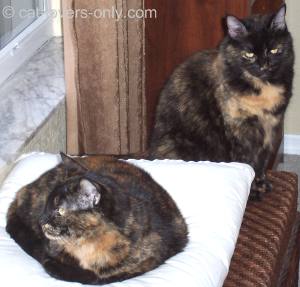
Most indoor cats will agree to share territory and time share specific "favorite spots" with the other cats in the house.
Disputes occur, but they're usually not major.
Aggression between two or more cats in multi-cat households is often due to territorial disputes that go unresolved.
A proper introduction in the first place can prevent a multitude of issues, but it will take some work and some refereeing on your part to resolve a cat behavior problem that has already developed.
Aggressive cat behavior may also be a result of things going on that you don't see. For example, some cats in a household will fight with each other as a reaction to stray cats near the house outside.
Cat Communication
In the wild, the ancestors of the domestic cat lived a solitary life in northern Africa. They slept, hunted, and ate alone. They covered their tracks so as not to be preyed upon, and they behaved stealthy in order to hunt and catch their food (stalking is not for the loud or clumsy). Their very job is to remain undetected, and when challenged, to either fight off an attacker or escape into hiding.
As such, they don't necessarily have a lot of signals to communicate what's going on in a number of social situations. Nevertheless, they are very sensitive creatures, and communicate in a number of ways including vocalizations, purring, and distinct body language.
These aspects of cat behavior are extremely important, since this is how your cat tells you what she wants or doesn't want, whether or not she is content, and how you should treat her.
"A cat is a very sensitive animal. How he feels is how he acts. It is therefore very important to know how your cat is feeling."
"Some cats are very vocal, and although you can't always figure out what they want, you are aware that they do want something. There are other cats who express their feelings primarily through body language, such as a wag of the tail or the ripple of a back. If you are able to decipher your cat's feelings by how he expresses them with his body, you will be in closer touch with what your cat is feeling."
"I try to help people understand their cats' day-to-day needs, so that person and cat can relate in a way that promotes the emotional and physical health of both. However, many of my cases involve cats who have already developed emotional problems. Emotional problems often trigger medical ones. That's why I feel it is so important to treat the total cat."
-Carole C. Wilbourn
Cat Therapist
Author of the book Cat Talk, What Your Cat Is Trying To Tell You
This is an excellent book and will give you a lot of insight into cat behavior and how it relates to overall quality of life for your cat. If you want to better understand cats, I highly recommend you buy Cat Talk.
Cat Behavior Tip: Learn to know when your cat is trying to tell you something. Grooming behavior after play or exercise is usually a sign that your cat wants to rest. Time to leave her alone for a while.
Feline Vocalizations
Typically, if you talk to your cat, she'll talk back, at least at some point, with a variety of vocalizations. Of course, some cats rarely talk at all, and others talk much of the time.
Some breeds, such as Siamese cats, are generally more talkative than others. Excessive meowing, however, can be a sign of illness or at the very least, something behavioral that needs attention.
If your cat suddenly becomes more vocal than normal, it may be a good idea to ask a veterinarian for help. This is especially true if you notice other behavioral changes along with the increased vocalization.
Although there are exceptions, adult cats rarely meow at each other the way they meow at us. Meow, purr, roar, and other cat sounds are not only communication for cats, but a source of fascination for people.
Senior Cat Behavior
Cats are considered to be "senior" at or above age 7. As you can imagine, older cats begin to slow down a bit. Activity levels decrease, and they may sleep a bit more.
Senior cats are subject to certain health problems, including kidney failure. Special diets are available with less protein so as not to stress the kidneys, and veterinary visits should be more often.
Some experts are saying that low protein diets, however, may make matters worse. In fact, they're saying that poor quality cat food may be largely to blame for a host of problems in later life.
Take note if you see a change in your cat's appetite, sleeping patterns, weight, or behavior. These may be signs of problems developing.
Mobility may be a problem if your cat suffers from arthritis. This may make getting in and out of high litter boxes a problem. Make sure you account for this so as not to create inappropriate elimination or litter box problems.
Walking up the stairs or climbing cat trees may become difficult, so make sure you provide a comfort zone for your kitty that is low enough to not require too much climbing.
Older cats may have trouble grooming hard to reach areas, so you may have to groom your cat more often. They also may become cranky due to physical problems of which you may not be aware.
Cats are good at hiding pain, but if you test them, they may show you they're not in the mood to be messed with and this can be an indication of disease or discomfort. If you notice behavioral changes in your senior cat, get her checked out by your veterinarian.
Breed Specific Behavior
Certain cat breeds are known to exhibit certain behaviors. Of course, each cat is an individual (there's no denying that!), but there are some typical cat behavior patterns that apply to specific breeds.
Siamese cats, for example, are known to be smart, very vocal, and very demanding of attention from their owners. Members of the Siamese breed are also known for their mischievous behavior.
Ragdolls are known to be docile and friendly. The Maine coon cat is an excellent hunter, but has a gentle demeanor. Persians are known for being very loving.
Turkish van's and Bengals are known for loving water. Some breeds are said to be more affectionate than others.
More Cat Behavior Topics
Recommended Cat Books
Books about cats covering or including many behavioral topics.
Domestic Cat Behavior Patterns
Basic domestic cat behavior patterns such as hunting, territorial needs, and scent marking.
More Cat Behaviors and Patterns Explained
This article continues with a discussion of various cat behaviors including communication and body language, self-grooming, and a little bit about cat training.
Cat and Kitten Magazines
Learn more about behavior with a subscription to a cat magazine.
Cat Behavior Problem
Learn to think like a cat, and you can overcome feline behavior problems.
Tips on Solving Common Cat Behavior Problems
Some common cat behavior problems and tips for solutions.
Get Your Cat Behavior Problems Solved on TV with Housecat Housecall
You can have celebrity veterinarian Katrina Warren visit your home and work with you and your cat. You might end up on the show, or you can gain a lot of insight just by watching Housecat Housecall.
Cat Repellent Basics
Why does a cat lover need cat repellent? There are a number of reasons, including controlling where your cat goes or controlling where a neighbor's cat goes.
Cat Repellent for Furniture
An effective cat repellent for furniture, whether used as a scratching deterrent or to keep your cat off the furniture entirely, is double sided tape. Here are some more.
Do cats grieve?
Do cats grieve for the loss of another cat?
Electronic Cat Repellent Products
Electronic cat repellent products use high tech methods to control cat behavior. You can use them outside for garden intruders or indoors for counter surfers.
Natural Cat Repellent
Using natural cat repellent products, you can keep both your cat and foreign cats out of your yard, and away from your garden. There is a downside, however, to using these products.
Cat Care Basics
Cat care requires a bit of knowledge regarding what your cat wants and needs.
25 Cat Care Tips
Here are 25 tips to help you provide for your cat's needs.
Cat Facts
Learn more about cats in the cat fact section of the site.
Cats and Christmas Trees
Christmas trees can be a problem for curious felines. Here are some safety issues and precautions.
The Christmas Cat
Is your cat a Christmas cat and love holiday attention? Or hate it with a passion? Here are some more holiday safety tips for keeping your cat happy, comfortable, and out of harms way.
Choosing Kitten Names
Training your cat to respond to her name starts with choosing a name and sticking to it. Here's how.
Litter Box Problems
Solving litter box problems involves understanding your cat's wants and needs, as well as dealing with any physical or medical problems that be at fault.
Litter Box Training
Proper litter box training is usually a matter of creating the right environment and letting your cat's instincts take over. Starting your cat off the right way can prevent problems in the future.
Male Cat Psychology
Many male cat behavior problems, including spraying and urine marking, can be handled by a combination of neutering, and providing a safe environment that meets your kitty's needs.
Pet Psychologists
Pet psychologists specializing in feline can help with behavior problems that are particularly difficult.
Cat FAQ
Here are some frequently asked questions about felines.
Strange Cat Behaviors
What may seem like strange cat behaviors can be anything from an expression of stress, to illness, to misplaced aggression. It's just a matter of understanding what's going on.
Why Do Cats Do That?
Explanations for certain feline behaviors.
Have A Great Story About Strange Cat Behaviors or Funny Habits?
Does your cat have a funny habit? Do you have a great story about your cat's unusual, cute, funny, or strange behavior? Share your story with the rest of us!
Your Cat Behavior Stories
Click on the links below to read about other visitors' unusual, cute, funny, or strange cat behavior stories...
My cat seems to love menthol smell 




I recently have been using a pain-relieving gel on my upper arm, and my cat comes to sit beside me, rub his head against my upper arm, and lick at it (I …
Sammy the sausage cat 




Every time I go where the cat bowl is, Sammy follows and begins to eat. I do mean it when I say every time. He has developed a bit of a weight problem …
Grieving Momma Cat 




I feed and shelter (garage) a colony of feral cats. Today, the original Momma cat (we call her Momma Cat) had one of her juveniles killed. She has been …
My cat knows how to spell! 




My cat, Gabby, knew "treat" so well that I thought I would give her a challenge, so I tried to teach her the spelling of it.
It only took her a couple …
Gizmo, the funniest cat ever 




When Gizmo first came home, he jumped on my bed and acted like my feet were mice. Two months later, Gizmo always messed with my bird, Lola.
At night, …
Cat rescued from plumbing 




Hi there. Well, here is a great story I thought you may like... Michi (girlfriend) bought two cats 8 months ago. I am not fond of cat's (sorry), but they …
My cat should have been a dog 




Our family cat, Po is a unique character. He started as a high energy, very playful guy into well, I believe a dog.
Po loves to fetch marbles and bouncing …
My cat needs ME to be in his sight! 




My cat Dino came home after being gone for a month! He's an indoor/outdoor cat who loves to take small adventures, usually a few days to a week during …
Strange lovable cat toy 




Strange lovable cat toy--my cat Shadow loves the plastic liner off a jar. When you pull it off it's in a round shape. He loves it and it makes a crinkle …
Photographer Cat! 




This isn't really about my Cat Joss, but I totally wanna rig him up with one of these.
This is Cooper the photographer cat! He wears a little camera …
Alexander Our Maine Coon and My Dad's Expensive Shoes, Part Two 




Read Part One of Alexander the Maine Coon...
I found all of the trappings of his corporate identity that had been stripped from him; they were piled …
What reaction does my cat expect while playing with me? 




My cat seems to have this chasing "game" that he wants me to play with him, but I don't know how he expects me to react. Does anyone know anything about …
My cat bites my head 




Matteus is our recently adopted 5 year-old male neutered cat. We have 1 and a half other cats (our female recently gave birth) and the three seem to be …
Some cats do things to show you how they feel 




Some cats do things to show you how they feel including leaving poo on your floor. Do not let some of these supposed cat experts say cats do not poop on …
Suddenly, there were THREE cats here... 




Four years ago, in midsummer, a neighborhood ginger stray came up our sidewalk to our front porch while I was sitting there. I gave her a saucer of water …
My Lazy Peanut 




I have a Classic Brown Tabby Mix and his name is Peanut. I gave Peanut some catnip one day. Maybe even a little too much.
When I gave him the catnip, …
Cat walks around the apartment 




My Cat is male, fixed and declawed. This is strange. We let him outside on a chain, but after he tells us he would like to go outside, he does a walk all …
Paper bags as cat beds 




The other day I was looking for our cat Queen. I had the whole house call her. I searched the bedrooms, the closet, all of her special places. A few minutes …
My cat 'prays' 




I have been owned by cats for 25 years now. My newest addition, Simone, began doing this strange motion about 2 months ago at age 7 months.
She will …
My Kitty Plays Fetch 




I have a 9 month old cat who's a female. Since she was 5 months she's been playing fetch with me. She will bring me her favorite ball and place it by me …
My cat waits for me 




Every morning when I get up from my bed my cat is waiting for me at the door. He follows me to the kitchen, walking between my legs talking to me until …
My cat is cool 




My cat Joey likes to surf and ride bikes and he loves to ride on the back of my German shepherd! He is a very loving cat he licks my two dogs and it is …
Odd behavior? Cats that collect, move or hide objects 



My cat is a 4 yr old neutered male. For about 2 yrs now we have noticed that our cat likes to go into our son's room and drag things down stairs and put …
Techno Cat 



Cinnamon, our 4-year old cat, has found the value of technology. My daughter, Alli, just got one of those fancy cell phones that gets the internet. What …
My cat thinks she's my mother! 


My cat, Squeaky, loves me the best out of our family. She makes special noises at me, sleeps with me, and tells me to go to bed. She is soooo cute. She …
My orange tabby nibbles my ankles Not rated yet
My cat will walk beside me nibbling at my ankles to let me know he wants outside or he is hungry. He walks to the door and will say meow when he wants …
Hide and seek cat! Not rated yet
Jet is a Jet black 18/20 month old cat. We got him from a rescue center a year ago. He runs into the kitchen, lowers his head and skids out the door.
…
My cat plays with toy mice Not rated yet
My calico cat named Carrie will get me up in the middle of the night with a low growl. When I get up to see what is wrong, I find her with a stuffed mouse …
Weird Fat Cat: Cassie Not rated yet
I noticed every now and then my cat, Cassie, lays on her back. It turns out that she taught herself that trick after seeing me lay on my back on the floor …
Alexander Our Maine Coon and My Dad's Expensive Shoes, Part One Not rated yet
This is the story of how our family cat completely transformed my Dad while I was growing up. If anyone has any doubts about the influence of a beloved …
Drops latest kill at my feet Not rated yet
One time my cat came home and he had this thing in his mouth and he was attempting to be sneaky about it. At first I thought it was a banana peel (yeah …
My cat and dog, so cute! Not rated yet
I'm Sarah, age twelve and I recently got a dog, and she likes to "play" with my cat. She is small, a havanese (also small for her breed), and she'll come …
My cat freeks out when I vacuum Not rated yet
My male tabby Ceaser freaks out when I vacuum. I have to put him in a pet carrier and he starts howling the whole time I vacuum. Then when I let him out …
Cat+Goldfish=uh-oh Not rated yet
I recently got a goldfish at a local Petco. My cat is absolutely fascinated by it. Her name is Angel and the fish is named Fin.
My cat sort of woke …
My cat Joey Not rated yet
Well when my cat was little we knew he was special. Let's say about 4 years ago, Joey saved my dog's life by waking us up by meowing because my dog started …
*Recent evidence indicates that cats were domesticated at least 5,300 years ago, and there's some evidence that the cat-human relationship could go even further back than that.
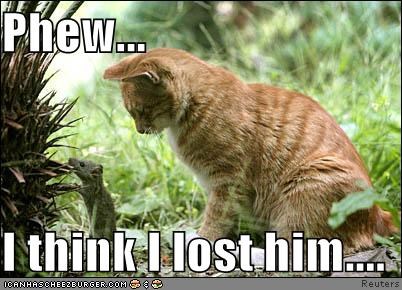
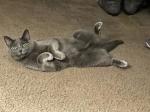
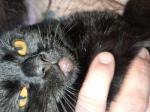
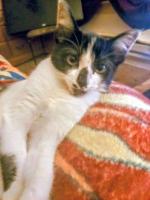
Comments: What do you think?
Have your say about what you just read. Leave me a comment in the box below.